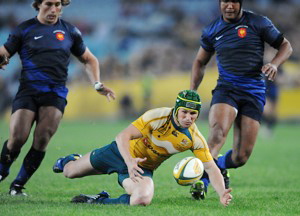
Australia's Matt Giteau slides in to gather up a loose ball during the Australia v France Rugby Union test at ANZ Stadium, Sydney, Saturday, June 27, 2009. (AAP Image/Dean Lewins)
The defining moment of the Australia (22) v France (6) Test at the ANZ Stadium came not long after half-time when France intercepted a pass deep inside their own territory (as they did to win the first Test against the All Blacks) and a certain try under the Wallaby posts was on.
The referee Dave Pearson, who missed knock-ons galore in the first half, immediately ruled an off-side. Matt Giteau kicked the penalty. Instead of the scoreline being 10 – 10, it had now stretched out for the Wallabies to 13 – 3.
Three more penalties to Giteau in quick succession, all in relatively easy positions, and the Wallabies and Giteau were up to 22 points for the match.
There was no way a French side that notably tired towards the end of the match (a consequence no doubt of their tough two Tests in New Zealand) was going to come back from this position.
To their credit, though, and a testimony to the fact that this is a very good French squad, they fought on, did not concede any more points in the last quarter of the match and came very close to scoring themselves.
Pearson’s decision was effectively a 10-point turnaround.
It seemed to me watching the replay that Luke Burgess had his hands on the ball before the French player made his run into the Wallaby line. Burgess’s rather laboured, harbour-bridge pass allowed an easy run on to the ball for the interception.
With the scoreline at 10 – 10 France would probably have lifted from their tiredness to run hard at the Wallabies and drive harder into the rucks and mauls. And if this had happened, who knows what the final result might have been.
Even with all the ensuing penalties, the scoreline would have been Australia 19 – France 13 for the last quarter of the match. France would at least have been within a converted try to win the Test.
This is, of course, all speculation.
The Wallaby defence was tremendous throughout the match. Early on a charge down allowed France to flood the Wallaby line. But somehow the scrambled defensive line held.
And in the second half, there were times when France threatened only to be cut down by a defence that would not give up a try.
Outstanding for the Wallabies was George Smith. He made tackles, one of them quite late for which he was penalised, and snaffled the ball in his hits time and time again.
Robbie Deans, who knows something about how good a loose forward can be through coaching Richie McCaw, called Smith a ‘one-man band’ at the breakdown.
He is a freakishly good player who is carrying the Wallabies at the break-down. He doesn’t seem to get injured and while this is so the Wallabies have one of the best, if not the best ‘fetcher’ in world rugby.
The Wallaby set pieces, especially the lineout, looked strong. The scrum is definitely better than last year, although occasionally it buckles. It does put more pressure than in the past on the opposing scrum now, though.
The back three are developing Deans’ Crusader game of running the ball back from kicks, where possible, with some profit. It is this pace and work rate of the back three, and their general accuracy in the lines they run, that is rightly keeping Lote Tuqiri out of the team.
Where Tuqiri often complained about not getting the ball, and leaving his wing (something Deans does not like) to look for work, the current back three are getting many touches – and, more importantly, doing something creative with the ball on many occasions.
The other great improvement is the developing combination of the five-eighths, Giteau and Berrick Barnes.
Deans has always preferred the traditional New Zealand system of two five-eights rather than the Australian system of two centres. The two five-eights, as they showed in the first and only try of the Test, offer running, passing and kicking options that are difficult for defences to contain.
So the Wallabies have had four matches in their 2009 campaign. The Barbarians match was a romp that didn’t tell us a great deal, other than that James O’Connor is a terrific talent.
The two Tests against the Italians (who gave the All Blacks a very hard match winning the possession and position statistics and keeping the home side to only 3 tries) showed that the pack was at least competitive and that the back three has the speed and systems to challenge staunch defensive lines.
The Test against a strong French side showed that the pack can stand up to brutes. There is a growing fluency about the play of the Wallabies which was not reflected in the try statistics.
Overall, one can say that Matt Giteau (with his aspirations to be the leading five-eighths in world rugby) and the Wallabies (with their eyes on the Tri-Nations and the Bledisloe Cup) are right on target.





























































































